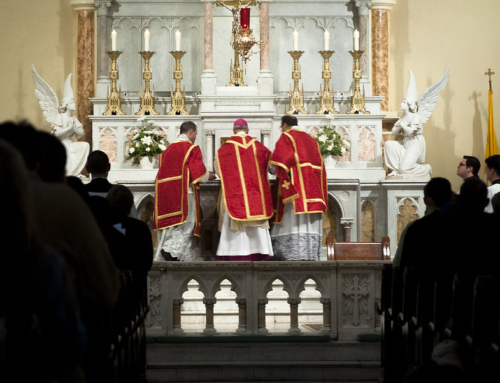
One of my most searing schooltime memories comes from second grade religion class, as we prepared for our first Holy Communion. To help us appreciate the meaning of the Eucharist, the nuns had us singing a catchy little song that encapsulated everything, “Sons of God.” I don’t remember it all, but the chorus still sticks with me:
Sons of God, hear His holy Word!
Gather round the table of the Lord!
Eat His Body, drink His Blood,
and we’ll sing a song of love.
Allelu, allelu, allelu, alleluia.
I’ll never forget the visceral horror that convulsed my compact little body, as if I’d just touched a dead rat, upon hearing those words. After class ended, I went up to Sister with inquiries. Surely this was just a figure of speech or something. Right? To her credit, she went straight to Scripture and offered a child-friendly summary of the following passages in the Gospel:
“I am the bread of life.Your ancestors ate the manna in the wilderness, yet they died. But here is the bread that comes down from heaven, which anyone may eat and not die. I am the living bread that came down from heaven. Whoever eats this bread will live forever. This bread is my flesh, which I will give for the life of the world.”
Then the Jews began to argue sharply among themselves, “How can this man give us his flesh to eat?”
Jesus said to them, “Very truly I tell you, unless you eat the flesh of the Son of Man and drink his blood, you have no life in you. Whoever eats my flesh and drinks my blood has eternal life, and I will raise them up at the last day. For my flesh is real food and my blood is real drink. Whoever eats my flesh and drinks my blood remains in me, and I in them. Just as the living Father sent me and I live because of the Father, so the one who feeds on me will live because of me. This is the bread that came down from heaven. Your ancestors ate manna and died, but whoever feeds on this bread will live forever.” (John 6:52-60)
I said something like, “Wow,” but still looked skeptical. Then she finished the story:
From this time many of his disciples turned back and no longer followed him.
“You do not want to leave too, do you?” Jesus asked the Twelve.
Simon Peter answered him, “Lord, to whom shall we go? You have the words of eternal life.” (John 6:66-68)
However literally or figuratively your Christian tradition interprets Jesus’s words here, if you haven’t at least tried to reckon with what they might mean — to the point of feeling scandalized like the disciples — then you aren’t taking them seriously.
Can I Opt Out of Redemption? Please?
I had a comparable experience the first time I watched The Passion of the Christ, which I covered for The American Conservative in 2004, as a campaign was waged in the media to cancel the film as “antisemitic.’ Yes, the violence had me squirming in my seat the way I did while watching the scene about the Normandy landing in Saving Private Ryan. In fact, in both films the punishing on-screen savagery left me numb after 20 minutes. I don’t think I was alone, and I think the in-your-face brutality of both movies constitutes an artistic flaw. I can hardly recall anything that happened onscreen after my cinematic PTSD kicked in. It might as well have been old Looney Tunes cartoons, for all I would have noticed.
But I remember this: Watching Jesus suffer, and suffer, and suffer for my sins provoked in me at last this unexpected reaction. I found myself telling God, It wasn’t worth this. I’m not worth this! I never asked You to endure this for my petty soul and petty sins. Undo it, forget me. Just uncreate me and call it even, okay? Do we have a deal?
Since I’m still here, though, obviously you know the answer.
I think most serious Christians have to wrestle at some point with their own role in Jesus’s death, with the fact that He would have died that way to save just a single sinner, even if he or she was the only sinner on Earth. That means we can’t squirm out of our responsibility for His Passion on Good Friday … whether we’re happy with God’s divine economy or not.
But that doesn’t mean we can’t try. In fact, much of Christian history can be explained as our effort to do exactly that: to nullify, subvert, or even invert the significance of Jesus’s death on the Cross, to soothe our wounded pride. It’s the effort to find some other scapegoat on whom we can dump our own guilt for Jesus’s death — as if that would somehow lighten His cross. It certainly lightens our own … or so we think.
We Have to Shout “Crucify Him!” in Church
A third sobering religious experience I must recount wasn’t a one-time thing. In fact, it happens every year, as it’s designed to. At the Mass for Palm Sunday since Vatican II, the congregation and clergy act out the Passion of Christ in the Gospel. Fittingly, the priest reads Jesus’s words. The lector narrates and reads the lines of every individual speaker, such as Caiaphas and Pilate. But the congregation must repeat the words of the mob in Jerusalem, including “Crucify Him! Give us Barabbas!”
Every year, saying such words out loud gets right under my skin — as, of course, it is meant to. I object to many of the liturgical changes made in the 1960s by my church, but this one seems like an improvement. In the old rite, the Gospel was sung by priests and deacons, in Latin no less. Just listening to them repeat the words, perhaps in soothing Gregorian chant, doesn’t have the same effect.
You can pretend that this was some historical event long, long ago. You can tell yourself that if you’d been in the crowd that Friday, you would have acted differently. You would at least have kept silent, maybe even courageously and heroically resisted … unlike all those perfidious Jews.
Yes, it’s their fault, not mine. I had nothing to do with Jesus’s death. I’m on His side, in fact!
The Pogroms of Holy Week
One of the most shameful aspects of Christian history has been our organized and theologically rationalized mistreatment of Jews. Popes had to lock them in ghettos in Rome to protect them from ignorant Christian mobs, who showed their gratitude for the gift of monotheism and salvation by spitting on Jews and beating them — and sometimes far worse. During social crises and popular rebellions, Jews were frequently scapegoated as causes of the plague, or ritual killers of infants, or blood-sucking moneylenders who deserved to be robbed and expelled. Rogue crusaders, despite the clergy’s best efforts, sometimes massacred helpless Jews rather than fighting well-armed Muslims. Even Martin Luther called for the mass persecution of Jews.
Some of the worst historic violence by Christians against Jews would happen during Holy Week, when believers who’d spent long hours in church meditating on Jesus’s suffering emerged from church — and would march over to the Jewish quarter to avenge it. Pogroms during Holy Week and Easter were regular nightmarish events in Tsarist Russia. In Spain, a dark folk tradition for Holy Thursday entails downing a special kind of sangria called Matar Judios (“Killing Jews”). What bleak historical memory is that name based on? I’d rather not know.
The New Zealots
Meanwhile, in our own time, a new breed of anti-Jewish activism is becoming popular on the Right — a Gentile tribalism that treats Christianity not as a set of eternal truths that shape the soul, but an ethnocultural marker. By saying “I’m a Christian,” these people mean mostly, “I’m not a Jew!” And when they say “Christ is King!” they might as well be shouting “Heil Christ!” with a straight salute. The reason I bring this up in a reflection on the Passion is that some Catholics on the Right are protesting the Palm Sunday custom of the congregation playing the part of the crowd in Jerusalem. This recent X post started a huge chain of responses, far too many of them approving.
Palm Sunday reminder: under no circumstances should anyone be yelling “Crucify Him!” at Mass today, OR EVER.
You are not a Pharisee, you didn’t come from Pharisees, and you sure as hell aren’t acting in a Pharisee play. You’re participating in the Holy Sacrifice of the Mass. pic.twitter.com/WGGLnsyJtt
— Mason-Dixon Latin Mass Society (@MDLatinMass) April 13, 2025
It’s perhaps too gentle to say that this person has entirely missed the point of the Passion. He has in fact turned it upside down, transforming Jesus’s death from a gracious response to the absolute fallenness of every man, woman, and child into an ethnic grievance on the order of George Floyd or the Alamo.
There are political reasons underlying such reactions, which include the toxic, pervasive addiction of so many secularized Jews to leftist politics as a replacement religion for the Judaism they abandoned. Probably more important is the fact that since World War II, anti-Nazism has replaced Christianity as the civic religion of the West. This watered-down, post-Christian creed condemned certain kinds of hate and some forms of nationalism, insofar as they reminded people (rightly or not) of the Nazis, while winking at Communist crimes, approving racist chauvinism among ethnic minorities, then paving the way for abortion, open borders, and transgender madness.
Spend decades telling everyone that the most common-sense, Natural-Law responses to treason, perversion, and child-killing are really “Nazi” or “Nazi-adjacent,” and eventually you’ll get them to give the actual Nazis a second look. Which, of course, is precisely what Screwtape wants. As the false cult of Post-Christianity falters under the weight of its piled-up absurdities, he hustles souls to the equal and opposite evil: minimizing or trivializing Nazi evils. Screwtape controls the pendulum and makes sure it never stops swinging. He doesn’t care if we enter Hell by the left door or the right.
Conversely, among those who steadfastly resist the temptation to scapegoat Jews, Screwtape offers the option of instead scapegoating Palestinians, including their women and children. So if “Kill the Jews!” doesn’t float your boat, Screwtape would like to interest you in “Flatten Gaza.”
Lord have mercy on us all.
John Zmirak is a senior editor at The Stream and author or coauthor of 14 books, including The Politically Incorrect Guide to Immigration and The Politically Incorrect Guide to Catholicism. His newest book is No Second Amendment, No First.
The post If You Won’t Shout ‘Crucify Him!’ Perhaps You Prefer Barabbas appeared first on The Stream.
Subscribe Below To Our Weekly Newsletter of our Latest Videos and Receive a Discount Code For A FREE eBook from our eBook store:





